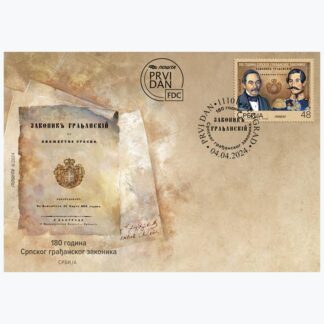Description
One of the earliest and most significant modern codifications of civil law in 19th-century Europe, the first and only comprehensive civil code in Serbia, the longest-lived code in the history of modern Serbia, the Serbian Civil Code, was adopted on March 25 (March 11 according to the old calendar) 1844.
The development of the young Serbian state, the foundations of which were the Sretenje Constitution (1835) or the so-called Turkish Constitution (1838) conditioned the need for the creation of a civil law code that would confirm the inviolability of private property and provide a legal framework for the transformation of the backward feudal society under Ottoman rule into a modern, European bourgeois society.
In 1829, Prince Miloš appointed the Legislative Commission for the Drafting of the Code, with the instruction to compile a short compendium of law modelled according to the Austrian Civil Code, but based on Serbian customary law. The translations of foreign laws were not entirely in accordance with the conditions and circumstances in Serbia, so in 1834 the work of the Commission on drafting the Code was suspended. In 1837, the continuation of the work was entrusted to the lawyer and writer Jovan Hadžić.
The Serbian Civil Code, promulgated at the Annunciation in 1844, during the reign of Prince Aleksandar Karađorđević, best illustrates the continuity of Serbian society's aspirations to join the modern states of Europe in an important aspect of statehood and civil legislation.
The foundation of this Code was the Austrian Civil Code, but the influences of common law, Roman law, the French Civil Code from 1804, and Church and Sharia law can be seen in it. The Code affirms liberal principles and values, supplementing the constitutional norms of the Turkish Constitution from 1838.
The importance of the Serbian Civil Code, which with a total of 950 articles is among the shortest civil codifications, is reflected in the fact that its adoption made a departure from the Ottoman legal legacy and established a social and legal order based on personal freedom and private property, which made the young Serbian state of those times focused on the European path.
Expert collaboration: ”Svetozar Marković” University Library, Belgrade
Artistic realization: Miroslav Nikolić and Nadežda Skočajić, Academic Graphic Artist






